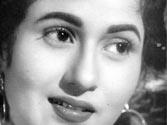Madhubala — the very name evokes an image of ethereal beauty, grace, and charm so transcendent that even the heavens might have envied her. No wonder she was lovingly called “The Venus of Indian Cinema.” Yet, behind that dazzling smile and angelic face lay a story steeped in sorrow, sacrifice, and heartbreak.
February 14 marks her birth anniversary, and Glamsham.Com remembers the legendary actress whose life, despite its brilliance, was shadowed by tragedy.
As the saying goes, “Every rose has its thorns.” Madhubala’s life embodied this truth. Though blessed with extraordinary beauty and fame, her journey — cut short at just 36 years — was marked by pain and unfulfilled longing.
Her childhood was weighed down by responsibility. Born Mumtaz Jehan Begum Dehlavi, she was barely nine when her father, Ataullah Khan, compelled her to enter films as Baby Mumtaz to support their struggling family. Her rise to stardom was swift, but her life remained under her father’s strict control.
At the peak of her career, Madhubala found love in Dilip Kumar, the tragedy king of Indian cinema. Their pairing on screen was magical, their off-screen bond even more intense. For a brief moment, happiness seemed within reach — until her father intervened. Fearing that her marriage would end his control over her career and income, he opposed their union.
The situation worsened when Ataullah Khan allegedly filed a legal case against Dilip Kumar, accusing him of deliberately replacing Madhubala with Vyjayanthimala in B.R. Chopra’s Naya Daur. The accusation created a media storm, casting an unwarranted shadow over both stars. However, in court, B.R. Chopra himself clarified that Vyjayanthimala had always been his first choice, exposing the baseless nature of the claim.
The incident left an irreparable scar on Dilip Kumar’s heart. He withdrew from Madhubala’s life, and though she tried to mend the relationship, it was too late. Heartbroken and emotionally drained, she eventually married Kishore Kumar. Yet, the marriage brought her little solace. Illness soon consumed her — a congenital heart defect, ventricular septal, which would claim her life at a tragically young age.
Her final years were spent away from the spotlight, her radiant face hidden behind the pallor of sickness. But even in her fading days, her beauty remained hauntingly serene — like a fading rose that refused to wilt.
Madhubala’s story is one of divine beauty entwined with human pain — a reminder that even the brightest stars sometimes burn the fastest. Decades after her passing, she continues to live on in the collective memory of Indian cinema, her smile eternal, her eyes still echoing untold stories of love and loss.

